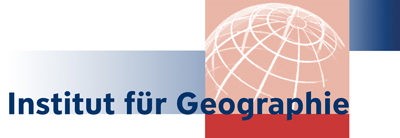YRG Geographies of Digital Infrastructures
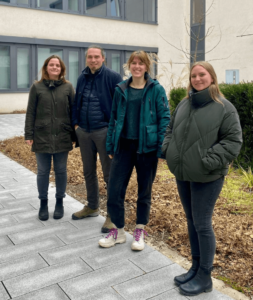
The young research group focuses on an often invisible material geography of our increasingly digitalised world: digital infrastructures and their embedding in geopolitical tensions and conflicts. In order to research the resilience of digital infrastructures, the security of internet routing and new and emerging dependencies, the junior research group is developing an interdisciplinary connection between digital geography, GIScience and IT security research – and applying it to benefit international peace and conflict research as well as critical infrastructure research.
The research project, which has been funded by the BMBF since 1 October 2024, addresses a research gap in the scientific debate on Internet infrastructures: The implications of geopolitical conflicts and tensions on the routing of data packets via IP and on the resilience of digital infrastructures have so far remained largely outside the field of vision of information technology and social science research on digital communication systems. However, the effects of geopolitical conflicts on providers of basic Internet infrastructures – such as Internet service providers, interconnection service providers or providers of content delivery networks – have repeatedly become apparent in recent years: In the trade conflict between the USA, China and the EU, in Russia’s war against Ukraine or currently in the war in Israel and Gaza, providers and operators of digital infrastructures are increasingly appearing as actors that have a direct influence on geopolitical tensions and conflicts. As part of the junior research group, the project develops an interdisciplinary context for researching the implications of geopolitical conflicts on the resilience of digital infrastructures, the IT security of internet routing and the newly emerging dependencies of providers of basic internet infrastructures – and uses three empirical case studies on current geopolitical tensions to make these fruitful for peace and conflict research as well as for German and European digital policy.
The young research group follows up on a start-up project for innovative research topics by Finn Dammann, which was funded by the Bavarian Institute for Digital Transformation (bidt) as part of a separate position from November 2022 to April 2023.
Governing Digital Circulation in Germany and Europe
Who controls the circulation of digital data and information, how and with what objectives? This question is a central subject of numerous debates in science and politics. The term ‘digital sovereignty’ is often used to problematise social dependence on globally active digital companies. This research project examines which political ‘digital’ geographies are produced linguistically-discursively and technically-materially.
Understanding Changes in Digital Knowledge Production
Digital technologies are also associated with new forms of organisation, collection, processing and presentation of geographical knowledge. In open map projects (Volunteered Geographic Information) such as OpenStreetMap, thousands of users voluntarily and consciously produce geodata for a shared database. We are researching the effects of social inequalities, economic interests and traditional cartographic epistemes on forms of collaborative geographical knowledge production.
Methods and Innovations in Geography
The digital transformation offers geography in particular new opportunities and impulses for the further development of its research processes and methodologies. At the interface between digital geography, critical cartography and platial GIS, we are working on new and alternative forms of spatial data analysis and geovisualisation.
We are not currently advertising any specific topics, but are happy to receive enquiries from the field of digital infrastructures.
Theses mentored in the past:
- Robin Blum (2025): “Diálogo es la ruta” – Potentiale zivilgesellschaftlicher Einflussnahme auf den Friedensprozess in Kolumbien am Beispiel des ACVC (bachelor thesis)
- Frank Patrick (2025): Deutschland auf dem Weg zur Gigabitgesellschaft – Breitbandausbau als Grundlage der Digitalisierung im ländlichen Raum (master thesis)
- Lorenz Rickert (2025): Heimat als politischer Begriff – Naturschutz und Landschaftsbilder im Heimatdiskurs mit Fokus auf der AfD (bachelor thesis)
- Helena Hoffmann (2024): Erst unsichtbar dann unübersehbar: Die Nord Stream Pipelineinfrastruktur im Kontext des Russland-Ukraine Krieges (bachelor thesis)
- Maria Geißler (2024): From Hashtag to Haircuts: digitale Solidarität mit der iranischen Frauenbewegung. Eine Instagram-Analyse der Solidarität in Deutschland (bachelor thesis)
- Jan Pereira de Carvalho (2024): Multidimensionale Territorialität während der COVID-19 Pandemie am Klinikum Nürnberg-Nord (Zulassungsarbeit – co-mentorship)
- Sophia Christa (2023): Geopolitisierung erneuerbarer Energien in Deutschland vor dem Hintergrund des Russland-Ukraine-Kriegs (bachelor thesis – co-mentorship)
Publications
- Boris Michel & Finn Dammann (2024). Breakdowns, (Un-)Sichtbarkeiten und glitches. Kritische Geographien der Resilienz digitaler Infrastrukturen. Geographica Helvetica, 79(4), 311–323. https://doi.org/10.5194/gh-79-311-2024
- Finn Dammann & Dominik Kremer (Eds): Geographical Research in the Digital Humanities. Spatial Concepts, Approaches and Methods. Reihe: Digital Humanities Research. [transcript] Bielefeld University Press (2024, Open Access)
- Finn Dammann & Dominik Kremer, D. (2024): Spatial Concepts, Approaches and Methods for Digital Humanities – An Introduction to the Book. In: F. Dammann & D. Kremer (Eds), Geographical Research in the Digital Humanities. Spatial Concepts, Approaches and Methods (pp. 7-11). [transcript] Bielefeld University Press
- Finn Dammann & Georg Glasze (2023): Politische Geographien der digitalen Transformation – Von der „globalen Informationsgesellschaft“ zur „digitalen Souveränität“, In: Martin Doevenspeck & Gabriele Schrüfer (Hrsg.): Konflikte, Bayreuther Kontaktstudium Geographie, Band 12, S. 1-21
- Finn Dammann (2023): Politische Geographien der digitalen Transformation – Umkämpfte Raumproduktionen vor dem Hintergrund der Politiken einer „Digitalen Souveränität“ in Deutschland, Friedrich-Alexander-Universität Erlangen-Nürnberg (FAU), Naturwissenschaftliche Fakultät (veröffentlichte Rahmenschrift der kumulativen Dissertation, open access)
- Georg Glasze, Frédérick Douzet, Amaël Cattaruzza, Finn Dammann (2023): Introduction: The Emerging Geopolitics of Data. In: Contested Spatialities of Digital Sovereignty. Geopolitics, https://doi.org/10.1080/14650045.2022.2050070 (open access)
- Georg Glasze, Finn Dammann, Max Münßinger, Didier Danet, Clotilde Bômont, Alix Desforges (2023): Reception and Elaboration of “Digital Sovereignty” in Three European Discourse Arenas: France, Germany, and the EU. In: Contested Spatialities of Digital Sovereignty. Geopolitics, https://doi.org/10.1080/14650045.2022.2050070 (open access)
- Jan Winkler & Finn Dammann (2023): Digitally Competent – Digitally Sovereign – Digitally Civic: geopolitics of Subject Formation in the German Context. In: Contested Spatialities of Digital Sovereignty. Geopolitics, https://doi.org/10.1080/14650045.2022.2050070 (open access)
- Finn Dammann & Boris Michel (Hg.): Handbuch Kritisches Kartieren. 2022, transcript (Leseprobe unter https://www.transcript-verlag.de/media/pdf/9f/e4/6b/ts5958_15VnFoRECbBf7u.pdf)
- Finn Dammann & Boris Michel (2022): Kritisches Kartieren – zur Einführung. In: Finn Dammann & Boris Michel (Hg.): Handbuch Kritisches Kartieren. transcript, S. 9-21
- Finn Dammann & Georg Glasze, G. (2022): Governing digital circulation: The quest for data control and sovereignty in Germany. Territory, Politics, Governance, https://doi.org/10.1080/21622671.2022.2141850
- Finn Dammann & Georg Glasze (2022): „Wir müssen als Deutsche und Europäer unsere digitale Souveränität zurückgewinnen!“ Historische Rekonstruktion und internationale Kontextualisierung der Diskurse einer „digitalen Souveränität“ in Deutschland. In G. Glasze, E. Odzuck, & R. Staples (Eds.): Was heißt digitale Souveränität? Diskurse, Praktiken und Voraussetzungen »individueller« und »staatlicher Souveränität« im digitalen Zeitalter, transcript, S. 29-60. (open access)
- Finn Dammann, Christian Eichenmüller & Georg Glasze (2022): Geographies of “digital governmentality”: Platform-based governing through adaptive environments. Digital Geography and Society, 3, 100034. https://doi.org/10.1016/j.diggeo.2022.100034 (open access)
- Julia Pohle, Leo Thüer, Finn Dammann & Jan Winkler (2022.): Das Subjekt im politischen Diskurs zu „digitaler Souveränität“. In: Norbert Kersting, Jörg Radtke, Sigrid Baringhorst (Hg.): Handbuch Digitalisierung und politische Beteiligung. Luxemburg: Springer Verlag. (open access)
- Finn Dammann & Boris Michel (2022): Digitale Ungleichheiten überwinden – kritisches Kartieren crowdbasierter Wissensproduktionen. In: Finn Dammann & Boris Michel (Hg.): Handbuch Kritisches Kartieren. transcript.
- Finn Dammann, Iris Dzudzek, Georg Glasze, Annika Mattissek & Henning Schirmel (2021): Verfahren der lexikometrisch-compterlinguistischen Analyse von Textkorpora. In: Georg Glasze & Annika Mattissek (Hrsg.): Handbuch für Diskurs und Raum. Theorien und Methoden für die Humangeographie sowie die sozial- und kulturwissenschaftliche Raumforschung, 3. Aufl., transcript, Bielefeld, S. 313-343
- Georg Glasze, Finn Dammann & Lea Bauer (2021): Wissen durch Karten. In: Tabea Bork-Hüffer; Henning Füller; Till Straube (Hrsg.): Handbuch Digitale Geographien, Welt – Wissen – Werkzeuge. utb.
- Finn Dammann & Georg Glasze (2021): Regieren und Steuern. In: Tabea Bork-Hüffer; Henning Füller; Till Straube (Hrsg.): Handbuch Digitale Geographien, Welt – Wissen – Werkzeuge, 2021
- Susanne Schröder-Bergen, Georg Glasze, Boris Michel & Finn Dammann (2021): De/colonizing OpenStreetMap? Local mappers, humanitarian and commercial actors and the changing modes of collaborative mapping. GeoJournal. https://doi.org/10.1007/s10708-021-10547-7
- Georg Glasze & Finn Dammann (2020): Von der ›globalen Informationsgesellschaft‹ zum›Schengenraum für Daten‹ – Raumkonzepte in der Regierung der ›digitalen Transformation‹ in Deutschland. In: Thomas Döbler; Christian Pentzold; Christian Katzenbach (Hrsg.): Räume digitaler Kommunikation, Halem. S. 159-182
Talks & Lectures
- Data Mobilities and the Material Geographies of Internet Infrastructures. T2M Annual Conference – Mobilities and Infrastructures: Transitions and Transformations (23. – 25.09.2024 in Leipzig, Vortrag gemeinsam mit Boris Michel)
- Interconnection Hubs, Content Delivery Networks & Submarine Cables – Implikationen geopolitischer Konflikte auf Internet-Routing und die Resilienz digitaler Infrastrukturen, 10. Juli 2024, Kolloquium am Institut für Geographie der FAU (Vortrag zur Eröffnung des Habilitationsverfahrens)
- Politische Geographien digitaler Infrastrukturen – Implikationen geopolitischer Spannungen und Konflikte auf Internet-Traffic, Fränkisch Geographische Gesellschaft, 11. Dezember 2023 (Vortrag)
- Politische Geographien der digitalen Zirkulation – Umkämpfte Raumkonfigurationen von Content Delivery Networks, Deutscher Kongress für Geographie, 22. September 2023 (Vortrag zusammen mit Boris Michel)
- Towards a Political Geography of the Digital Transformation. Workshop: Digital Geographic Movements and Methods, June 21-23, 2023 in Calgary, Alberta, Canada (Vortrag mit Georg Glasze)
- Political Geographies of Digital Infrastructures – Contested spaces of Content Delivery Networks, Session: Toward a Genealogy of Global Infrastructure: Histories, Temporalities, Ruptures. AAG Annual Meeting 2023 (Vortrag mit Boris Michel am 24.03.2023, hier geht es zum Abstract)
- Governing digital flows. Towards a digital geography of circulation. Digitale Geographien – Räume digitaler Zukünfte, 17. – 18. November 2022, Halle (Vortrag mit Boris Michel)
- AI in OpenStreetMap. A New Form of Data Colonialism? AAG Annual Meeting, 2021 (Vortrag mit Georg Glasze & Susanne Schröder-Bergen (Vortragende) und Boris Michel)
- “Colonizing of the crowd? Crowd-based geo-data production and urban platform capitalism.” Online Symposium Platform Urbanism Towards a technocapitalist transformation of European cities?, 2021 (Vortrag mit Boris Michel & Susanne Schröder-Bergen (Vortragende) und Georg Glasze)
- Kritische Kartographie zwischen postkolonialer Kritik und dekolonialer Praxis. Workshop „Mit offenen Karten. Kartografie und die Kritik daran.“, Online an der Universität Kassel, 2021 (Fortbildungsvortrag mit Boris Michel)
- Das „digital souveräne“ Subjekt. Konstitutionsmomente einer Subjektivierungsform im Regieren der digitalen Transformation. Neue Kulturgeographie, Technocultures & Technoscapes, 2020, Bonn (Vortrag mit Jan Winkler)
- „Wir müssen unsere digitale Souveränität zurückgewinnen!“ Eine Renaissance von territorialer Souveränität im Digitalisierungsdiskurs? Deutscher Kongress für Geographie 2019, Kiel (Vortrag mit Georg Glasze)
- „As Germans and Europeans, we must regain our digital sovereignty“ – a renaissance of geopolitical thinking in the problematisation of the digital tansformation? Conference paper for the Workshop of Extraterritoriality of Data, Tallin, 2019 (Vortrag mit Georg Glasze)
- „Deutschland muss seine digitale Souveränität verteidigen“ Der Einzug territorial-geopolitischen Denkens in die Konfigurierung der digitalen Transformation – eine Analyse politischer Rationalitäten. Workshop of the working group for political geography, Münster, 2019 (Vortrag mit Georg Glasze)
- Der „digital souveräne Staat“? Konflikte um die Produktion von Wissen zu Bevölkerung und Territorium. Workshop zu Globalisierung und Digitalisierung – (neue) Weltbezüge der Geoinformation, 2018, Jena (Vortrag mit Georg Glasze)
- Datenarmut im Zeitalter von „Big Data“? Oder: welche Rolle können Datenzentren an Universitäten für Lehre und Forschung der Sozialwissenschaften spielen? Interdisziplinärer Workshop: Das Ende der Theorie? Big Data in der Forschung (10.-11. Oktober 2017 – Orangerie, Erlangen, Vortrag zusammen mit Georg Glasze)
- Die Debatte um „Digitale Souveränität“ in Deutschland. Zwischen Regierungsrationalitäten der territorialen Abgrenzung und des neoliberalen Wettbewerbs. Deutscher Kongress für Geographie, 2017, Tübingen (Vortrag mit Georg Glasze)
- Forschung mit und über Geodaten in der Kulturgeographie. Kolloquium am Institut für Arbeitsmarkt- und Berufsforschung (IAB), Nürnberg, 2017 (Vortrag mit Georg Glasze)
- Language geography in OpenStreetMap – A geolinguistic analysis. Annual Meeting of the AAG (Association of Amercian Geographers), Boston, 2017 (Vortrag)
Projects/Workshops/Sessions
- Jahrestagung AK Digitale Geographien: “Geospatial Worlds: Geodaten, Code & Gesellschaft”, Erlangen-Nürnberg, 30. September bis 02. Oktober 2024 (Organisation zusammen mit Blake Walker, Georg Glasze und Studierenden im MA Kulturgeographie, hier geht es zum Rückblick)
- Workshop Neue Ansätze kritischer Geovisualisierung, 25. – 27. April 2024 in Halle (Organisation zusammen mit Boris Michel, Pablo Abend, Nora Küttel, Lea Bauer und Francis Harvey, hier geht es zum Call)
- Workshop zu Geographien von „Open Collaboration“ und „Digital Commons“, 7./8. Dezember 2023 in Erlangen (Organisation zusammen mit Thilo Lang, Georg Glasze & Boris Michel, hier geht es zum Call)
- Session zu „Geopolitisierung digitaler Infrastrukturen“, Deutscher Kongress für Geographie 2023, Frankfurt a. M. (Leitung zusammen mit Daniel Lambach & Georg Glasze, hier geht es zum Call)
- 6th Annual Humanitarian Mapathon – Wedn., 19th of April, 2023 (Co-Organisation für den Standort Erlangen zusammen mit Blake Walker, Dominik Kremer und Georg Glasze, hier geht es zum Programm )
- Konzeption und Prototypenbau eines Web 2.0 Kartographie Moduls für das Science Center Experimenta in Heilbronn (Projekt mit Georg Glasze; Mittel über Jochen Hunger Museum & exhibition design)
- Tagung „Räume digitaler Zukünfte“, Halle, 16.-18.11.2022. Moderation: Paper-Session zu „Digitalisierung als Werkzeug“. (Programm – Organisation: Leonie Büttner, Yannick Ecker und Boris Michel )
- Session zu Political Geographies of Data – Exploring digital territories, sovereignties and borders. International Geographical Union – UGI-IGU Paris – 18-22 July 2022 (mit Amaël Cattaruzza & Georg Glasze, https://www.geographie.nat.fau.de/files/2021/12/call-for-participation-political-geographies-of-data-igu-2022.pdf)
- Workshop zum Kritischen Kartieren sozialer Wirklichkeiten – Neue Formen und Ansätze kartographischer Wissensproduktion, Martin-Luther-Universität Halle-Wittenberg, 28.‐30.04.2022 (zusammen mit Pablo Abend, Lea Bauer, Francis Harvey, Nora Küttel & Boris Michel, Programm)
- Humangeographische Sommerschule „Digitale Geographien“, September 2021 (Organisation zusammen mit Georg Glasze, Blake Walker, Dominik Kremer und Studierenden im FAU Masterstudiengang Kulturgeographie, Programm)
- Workshop Geography meets Digital Humanities – Neuere Ansätze raumbezogener Modellierung, Digital, 2021 (Workshop zusammen mit Dominik Kremer, Workshop Geography meets DH – Programm)
- Technologie, Gesellschaft und Raum im Reden über das „digitale Zeitalter“, 2017, Erlangen (Workshopsorganisation mit Boris Michel) Workshop Technologie, Gesellschaft und Raum – Programm
Other publications
- Ungleich und umkämpft – Content Delivery Networks als kritische Infrastrukturen (Blogbeitrag, 20. Oktober 2023, Bayerisches Forschungsinstitut für Digitale Transformation, hier geht es zum Beitrag)
- Sprachgeographie in OpenStreetMap – Eine geolinguistische Metadaten-Analyse, 2016 (Unveröffentlichte Masterarbeit)
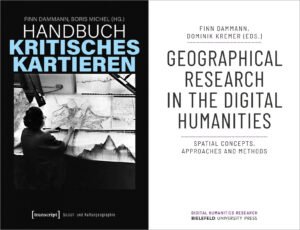
News:
Contribution to Critical Infrastructure Walks in Newly Published “Handbook of Mobile Methods in Social and Spatial Research“
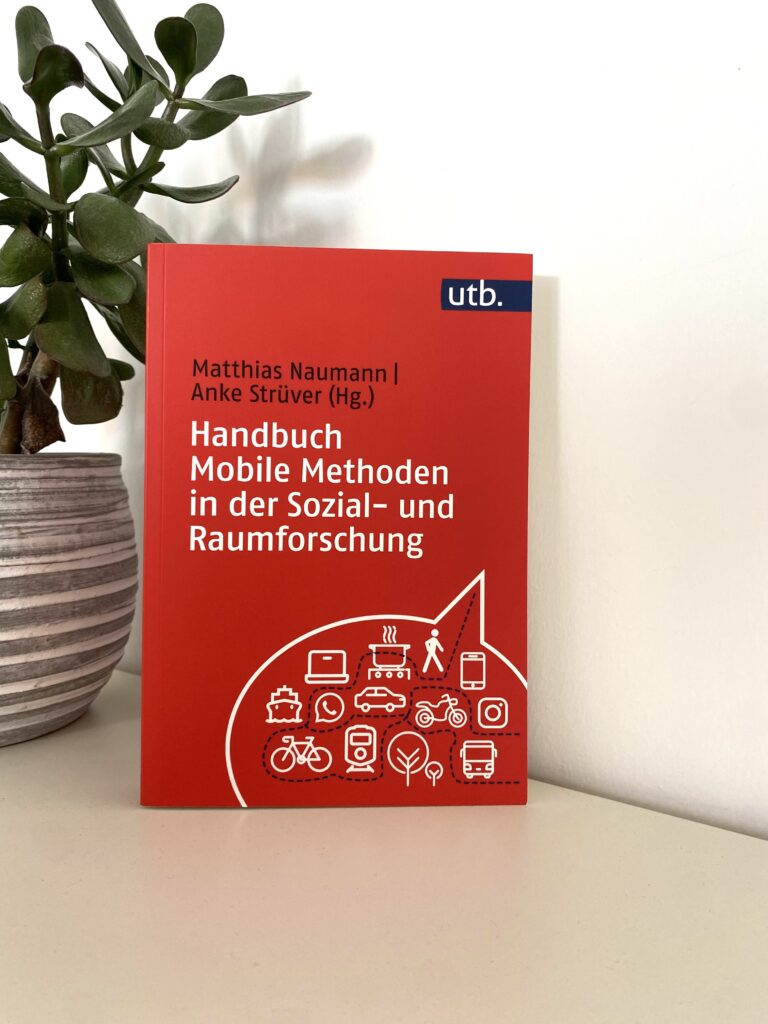
12.08.2025 – In July 2025, the ‚Handbook of Mobile Methods in Social Spatial Research‘ (edited by Matthias Naumann & Anke Strüver) was published with a contribution by Finn Dammann (together with Pablo Abend and Boris Michel) with the title ‚Critical Infrastructure Walks in Dataficated Worlds‘. The article shows the extent to which critical infrastructure walks can serve as a method for exploring and visualising material geographies and what new perspectives can develop from making visible the necessary work of maintaining digital infrastructures or even historical instability.
The handbook is available here.
International Annual Conference of the Royal Geographical Society from 26 to 29 August 2025 in Birmingham
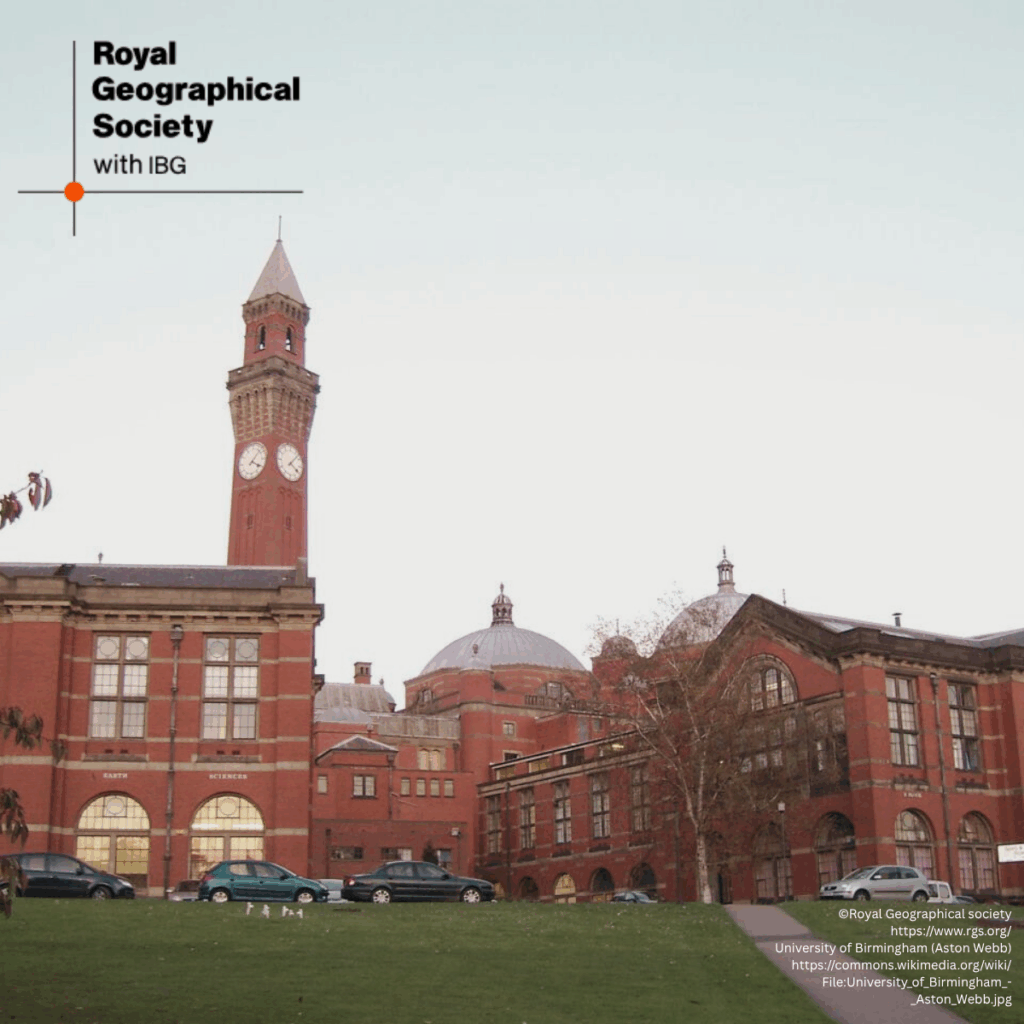
26.-29.08.2025 – We are happy to announce that our junior research group will be part of the annual conference of the Royal Geographical Society (RGS) with this year’s theme “Creative Geographies”. The RGS annual conference is a venue for geographers from all over the world and will take place at the university of Birmingham this year.
In the poster session, we will give insights into our current research on the topic “Interconnection Hubs, Content Delivery Networks and Emerging AI Infrastructures – Insights into the Material Geographies of Digital Ecosystems.”
It deals with geopolitical power issues and material inequalities of digital infrastructures in the Mediterranean region – and the question of what role they play in an increasingly datafied world.
We are looking forward to exciting discussions and dialogue on site!
You can find more information about the conference programme here.
Panel at the Annual Symposium of the Digital Geography Research Group, RGS-IBG

19.-20.06.2025 –
For the annual conference of the RGS Working Group on Digital Geography, Finn Dammann took the lead in organizing the panel on “Geopolitics of Digital Sovereignty in Global Comparison.” Together with colleagues from the Paris research center GEODE (Geopolitics of the Datasphere), we presented contributions from the new volume The Elgar Companion to the Geopolitics of Digital Sovereignty: Contested Networks, Territories and Self-Determination (to be published in summer 2025, edited by Georg Glasze, Amaël Cattaruzza, Frédérick Douzet & Finn Dammann) and offered a preview of future research areas in the rapidly expanding field of LEO satellite internet.
See here for more information about the panel.
Annual Conference of the Political Geography Working Group – Political Geographies in Uncertain Times
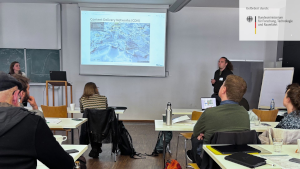
26.05.2025 – The Political Geography Working Group met in Freiburg from May 22 to 24, 2025, for its annual conference on this year’s theme, “Political Geographies in Uncertain Times.” In the session on the power effects of materialities, technologies, and more-than-human dynamics, we presented initial results from our research project “Interconnection Hubs, Content Delivery Networks, and Emerging AI Infrastructures – Insights into the Material Geographies of Digital Colonialism in the Western Mediterranean.” The conference provided us with many new impulses for our research field, and we would like to warmly thank the organizers for the productive exchange.
Interview about the Power of Google Maps in Bavarian Cities
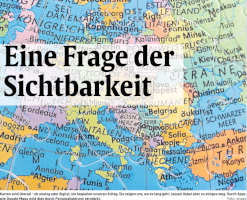
19.05.2025 – How does Google Maps influence our everyday perceptions and practices in urban spaces – and what alternative maps and geoservices are available? In an interview with the Abendzeitung München, Finn Dammann was asked about the significance of Google Maps in Bavarian cities, the challenges of digital sovereignty over one’s own (geo)data, and alternative mapping projects
See here for the online article.
Workshop: Recent Approaches to Critical Geovisualization
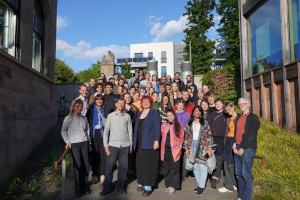
12.05.2025 – From May 8 to 10, this year’s interdisciplinary workshop between geographical research and research-based design took place in Halle at the MLU Institute of Geography and the Halle University of Art and Design. Together with around 80 colleagues and students from geography, GIScience, design, media studies, and art, we discussed recent approaches to the critical mapping of social realities and infrastructures – and tested new techniques and methods in hands-on workshops. The now third workshop on critical geovisualization was organized by Pablo Abend and Anna Unterstab (both Halle University of Art and Design, Burg Giebichenstein), Boris Michel and Nora Küttel (both University of Halle), Lea Bauer (University of Leipzig), Francis Harvey (IfL), and Finn Dammann.
Funding for doctoral student Josephine Brandenburg from the Bavarian Research Institute for Digital Transformation

05.05.2025 – Josephine Brandenburg, a doctoral student in our working group, has been selected for the funding program of the Graduate Center of the @Bavarian Research Institute for Digital Transformation (bidt). Every year, the bidt supports 25 doctoral students conducting research in the field of digital transformation and facilitates networking and further education in the field of digitization research.
We are very happy for Josephine and are excited to see what the future holds!
